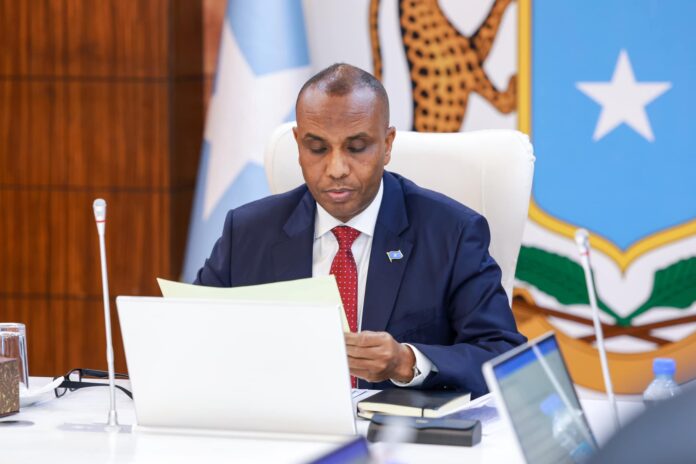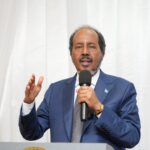MOGADISHU, Somalia — In a bold move during his inaugural address as the newly appointed Commander of Somalia’s Armed Forces, Prime Minister Hamsa Abdi Barre has openly challenged the legitimacy of the upcoming Jubaland elections.
The ceremony, held with military pomp and attended by high-ranking officials, turned into a platform for political critique when Barre addressed the issue of regional elections.
Prime Minister Barre directly criticized President Ahmed Madobe, the leader of Jubaland, questioning his legal right to organize or participate in the electoral process. “An illegitimate process cannot yield legitimate results,” Barre stated, emphasizing that the integrity of Somalia’s democratic processes must be upheld at all levels of governance.
He referenced Article 70 of the Jubaland constitution, which stipulates a two-term limit for the presidency, asserting that Madobe, who has been in power for nearly a dozen years, has no constitutional authority to either hold elections or seek re-election.
Barre’s comments come at a sensitive time when the federal government and the regional states, particularly Jubaland, are at odds over the control of elections. The Prime Minister’s critique not only highlights the ongoing constitutional disputes but also underscores the fragile relationship between the central government and its semi-autonomous regions.
The speech has reignited debates on regional autonomy versus federal oversight, with some seeing Barre’s stance as an attempt to assert federal dominance over regional elections. Critics argue that such interventions could destabilize the already tense political landscape in Somalia.
Jubaland’s election, scheduled for later this month, has been a point of contention, with Jubaland officials pushing for an indirect election system, which they claim better represents their local governance structure, in contrast to the federal government’s push for a one-person, one-vote system.
The controversy surrounding the legitimacy of the Jubaland elections could potentially lead to further political and possibly military confrontations, given the history of armed conflicts in Somalia over political control and governance issues.
Reaction from Jubaland authorities was not immediately available, but there’s anticipation that President Madobe might respond to these allegations in the coming days. The international community, especially neighboring countries and those with stakes in East African stability, are likely to watch closely how this electoral dispute unfolds, given its implications for peace and governance in Somalia.
The Prime Minister’s speech, while ceremonial in nature, has effectively set the stage for what could be a significant political showdown, testing the balance of power between Somalia’s federal government and its regional states.






